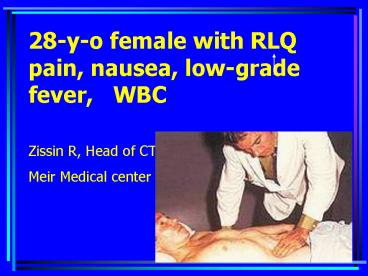Female with RLQ pain Imaging - PowerPoint PPT Presentation
1 / 23
Title:
Female with RLQ pain Imaging
Description:
28-y-o female with RLQ pain, nausea, low-grade fever, WBC Zissin R, Head of CT Meir Medical center Ac abd. pain - a diagnostic challenge RLQ - DD Acute appendicitis ... – PowerPoint PPT presentation
Number of Views:93
Avg rating:3.0/5.0
Title: Female with RLQ pain Imaging
1
28-y-o female with RLQ pain, nausea, low-grade
fever, WBC Zissin R, Head of CT Meir Medical
center
2
Ac abd. pain - a diagnostic challenge
- RLQ - DD
- Acute appendicitis (AA)
- Epiploic appendagiitis / Omental infarction -
non-surgical mimicker of AA - GI related Crohns disease (CD), Rt-sided
diverticulitis, Inf. enteritis (Yersinia),
Perforated cecal ca - Mesenteric lymphadenitis
- Acute GUT pathologyAc Pyelonephritis
- Renal colicGynecologic etiology
3
Acute appendicitis
- The most common cause of RLQ pain and 28 of ac.
abdominal pain - Treated surgically !!! Perforation rate 20,
(more common lt9y and gt60y) - The most common emergency in children and
pregnant women. - 6 chance during lifetime for each person
- Classic history periumbilical pain migrating to
RLQ only in 50, atypical presentation mainly
children, women 20-40y, elderly
4
Imaging modalities in acute abdomen
- Plain abdominal films supine erect LIMITED
INDICATIONS - US non invasive, no radiation
- CT semi invasive, radiation !
- Contrast media studies imaging of bowel only
(barium, gastrografin) radiation
5
Plain abdominal films - Indications
- 1. Detection of free air Common causes
perforation of hollow viscus, post-operation,
peritoneal dialysis - 2. Gas (air) distribution intestinal
obstruction dilated loops, air/fluid
levelsdisplaced loops a secondary sign of
mass effect - 3. Detection of pathological calcificationsMost
common calculi (20 of gallstones 80
urolithiasis), vascular,
intra-abdominal radiopaque foreign bodies - Usually insensitive in AA but can suggest an
alternative diagnosis
6
Ultrasound
- Advantages - Lack of radiation, non-expensive
and availability - - Aids in diagnosing alternative causes
- Disadvantages - Operator dependent !!
- - Sen 85-90, Spec 92-96, As NPP is too low
CT - Mainly in children childbearing age women
7
- Aperistaltic, noncompressible, blind-ended,
fluid-filled, tubular structure with distinct
wall layers arising from the cecal base - Outer diameter gt 6 mm
- Appendicolith
- Periappendiceal fluid collection
8
Computed Tomography - CT
- Radiation! (excludes pregnancy, consider
benefit versus radiation risk) - Semi invasive exam. IV injection of CM
9
1972
- ??? ????? ?-CT ?????? ????? ???? 1972
- ???? ??? ????? ???? ?? ?? ???,
- ??? ????? ????? 5 ???? ,???????? ?????
10
2005
- ??????? ?????? ??????
- ???? ?????? ?- CT ??????? ????? ?? ?? ???? ???
???? ?????, ??????? ????? ?????????? ??????
11
Type of CT examinations
- Diagnostic study
- Interventional procedure- F. N. A (fine needle
aspiration)- Diagnostic puncture
(bacteriological evaluation)- Drainage of
abscess, fluid collections - Screening - Virtual colonoscopy- Cardiac CT-
Low dose chest CT
12
Radiation on CT
- Abd CT ( 500 CXR)(BE-350 CXR, Upper GIT-150
CXR) - Typical effective dose 10mSv (time provide for
equivalent effective dose from background
radiation 3.3y) - Malignancy risk 5/1Sv 1 to 2000
13
Technical notes Abdominal CT
- Optimal technique OralIV Contrast Media - Oral
(for maximum GIT opacification) - -IV (semi-invasive) 120cc 2,5-4cc/sec
- Optional
- - Rectal
- - Cysto CT
- Delayed scan as necessary
14
5 tissues densities
ca
air
fat
soft tissue
fluid
Everything should be made as simple as possible,
but not simpler. Albert
Einshtein
15
Acute Appendicitis
- CT diagnosis depends on combined appendicular
and periappendicular signsCT sens. 94-97 spec.
97-99 accuracy 93-98 NPV PPV 94-98 - Appendicular signs distended (gt6mm),
unopacified thickened wall (gt2mm) app.
appendicolith - Periappendicular signs pericecal fat
strandingscecal mural thickening-arrowhead
16
Periap. Abscess Conservative therapy P.C.
abscess drainage gt 3cm
17
Epiploic appendagitis
- Torsion of EA-infarction and sec. inflammatory
changes - Clinical presentation L/RLQ signs of
peritonitis, mimicking ac. diverticulitis/
appendicitis - Benign, self-limited course
18
An oval-shaped fat density with a rim of
soft-tissue density juxtaposed to the serosal
colonic surface
19
Crohns Disease (CD) - terminal ileitis
- Diarrhea- most common presentation
- Gradual, progressive RLQ pain - 45-95
- Role of CTIn known cases - for detection of-
complications (abscess, enterovesical fistula,
perianal disease)- alternative diagnosis (look
for the appendix) CD may be first diagnosed on
CT in pts. presented with acute abdomen RLQ
pain
20
CT in CD
- Direct imaging of the bowel wall (normal lt3mm)
- Secondary signs in surrounding mesentery-mesente
ric vascular engorgement-fluid within the
mesenteric root-peri-bowel fat stranding,
creeping fat-mesenteric adenopathy - To guide P.C. interventional procedures
21
Stones and Obstruction
- Non contrast scan
- Determine the level of obstruction calculi, and
associated parenchymal changes
22
(No Transcript)
23
GOOD LUCK































